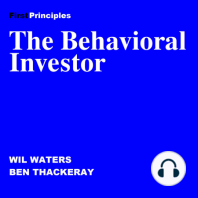32 min listen

S1E2 What a Psychologist Says About Hacking the Dopamine Reinforcement System to Compound Your Way to $1B
S1E2 What a Psychologist Says About Hacking the Dopamine Reinforcement System to Compound Your Way to $1B
ratings:
Length:
40 minutes
Released:
Aug 13, 2020
Format:
Podcast episode
Description
Tom Watts is a clinical psychologist. We interviewed him in order to learn from a master of human nature. His practice can be found here.
At the start of the episode, we mention a long term financial compounding example described in the previous episode. You are encouraged to listen to it for context. The same goes for this spreadsheet illustrating how much you can make from long term investing of this sort.
If you put the methods to work Tom discusses in this episode, you will have a chance attaining the goal expressed in that sheet.
Concepts and researchers mentioned by Tom with some Google Scholar links to send you down some profitable rabbit holes:
Delayed Discounting Theory.
Mazur J.E. An adjusting procedure for studying delayed reinforcement. In: Commons M.L, Mazur J.E, Nevin J.A, Rachlin H, editors. Quantitative analysis of behavior: Vol. 5. The effect of delay and of intervening events of reinforcement value. Hillsdale, NJ: Erlbaum; 1987. pp. 55–73. (Eds.) [Google Scholar].
Mazur on Neurotree.
More on the K component of the delayed discounting formula.
Smart goals.
Episodic Future Thinking.
---
Send in a voice message: https://anchor.fm/the-behavioral-investor/message
At the start of the episode, we mention a long term financial compounding example described in the previous episode. You are encouraged to listen to it for context. The same goes for this spreadsheet illustrating how much you can make from long term investing of this sort.
If you put the methods to work Tom discusses in this episode, you will have a chance attaining the goal expressed in that sheet.
Concepts and researchers mentioned by Tom with some Google Scholar links to send you down some profitable rabbit holes:
Delayed Discounting Theory.
Mazur J.E. An adjusting procedure for studying delayed reinforcement. In: Commons M.L, Mazur J.E, Nevin J.A, Rachlin H, editors. Quantitative analysis of behavior: Vol. 5. The effect of delay and of intervening events of reinforcement value. Hillsdale, NJ: Erlbaum; 1987. pp. 55–73. (Eds.) [Google Scholar].
Mazur on Neurotree.
More on the K component of the delayed discounting formula.
Smart goals.
Episodic Future Thinking.
---
Send in a voice message: https://anchor.fm/the-behavioral-investor/message
Released:
Aug 13, 2020
Format:
Podcast episode
Titles in the series (27)
S1E1 Putting Ben to Work by The Behavioral Investor